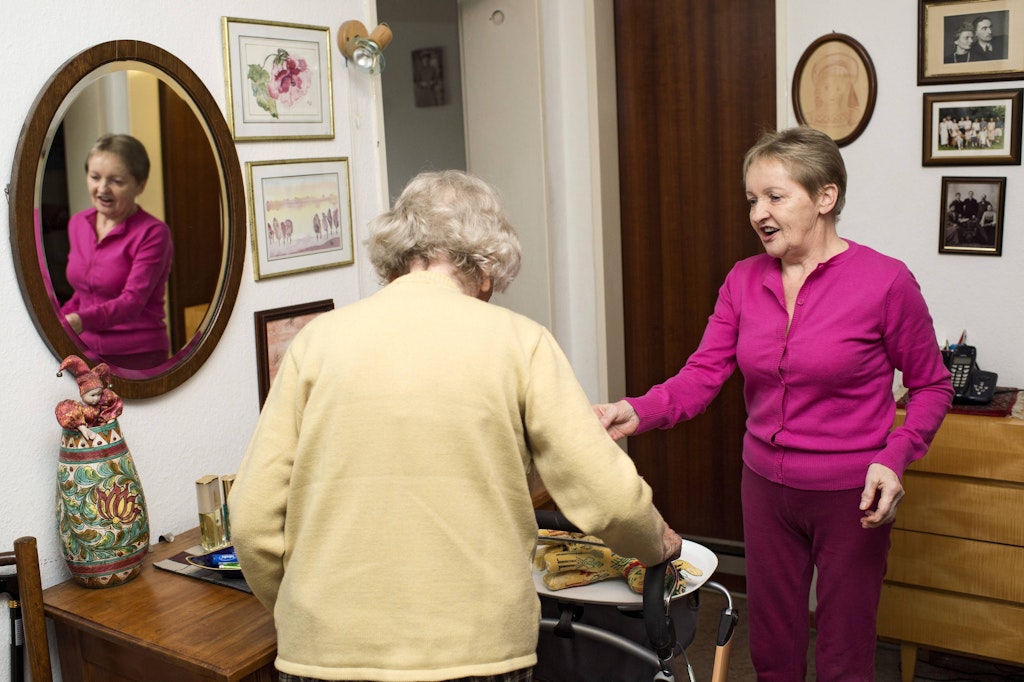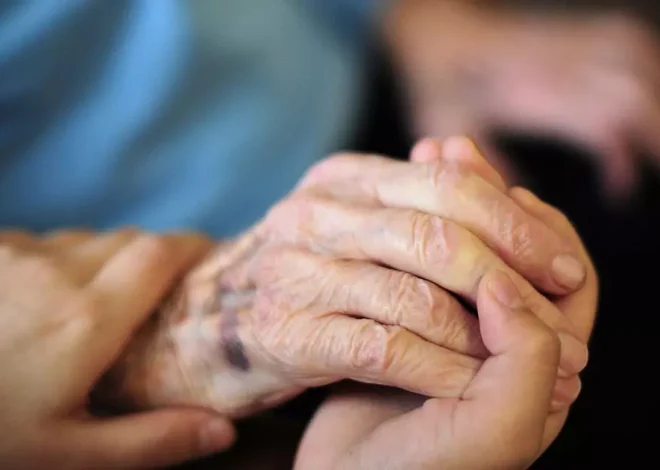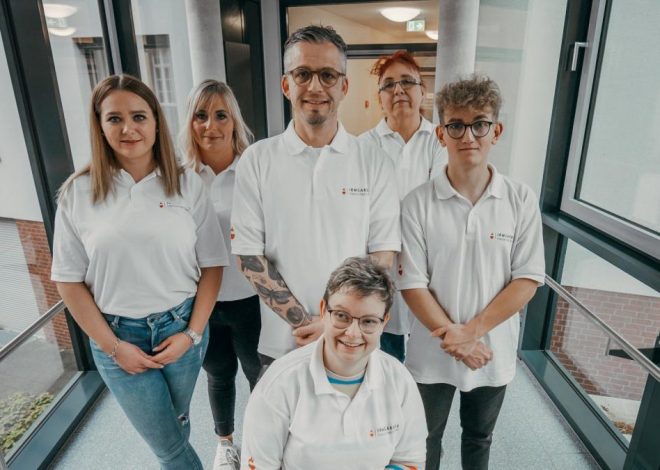
On average, relatives work full time – unpaid
The numbers sound almost unbelievable – once you realize what that means: Caring relatives currently work an average of 49 hours per week for their sick family members. And this time frame applies only to caring activities such as personal hygiene, feeding or administering medication, as the health insurance company AOK reported on Tuesday. Caring relatives also generally work unpaid.
The AOK Federal Association commissioned a survey for which the AOK Scientific Institute (WIdO) contacted a total of 1,008 caring relatives in August and September 2023. Participants from a 2019 survey were also surveyed again.
Good morning Berlin
Newsletter
Thank you for signing up.
You will receive a confirmation by email.
It became clear that the time required to care for relatives has increased by six hours per week over the past four years: from 43 to just 49 hours. And that the financial burden for, among other things, personal contributions in addition to nursing care insurance benefits has also increased significantly since then. By almost 50 percent.
You also have to know that these 49 working hours per week only concern care. Typically, household tasks such as cleaning and shopping or even bureaucratic tasks are not included. So these often come on top of that.
Caring relatives leave the profession – at their own expense
It is therefore not surprising that, according to AOK, home care is one of the main reasons why people reduce their working hours or even give up work altogether. The time pressure, especially on this scale, has a direct impact on their employment. Despite this, according to the survey, a full 46 percent of the so-called main caregivers still work full-time – that is, around 40 hours a week in their normal jobs, in addition to caring. 37 percent work part-time, and only 18 percent are not employed at all.
One reason for this is that family carers are not paid for their work – and so many are forced to continue working. Among those working part-time, more than half said they had reduced their working hours because of the care. Among those not working, 28 percent gave up their jobs because of the care.
“It is problematic that family caregivers are burdened with an average of 49 hours of care work per week at home and that home care apparently leads to almost one in four people reducing their working hours or giving up their employment altogether,” said AOK CEO Carola Reimann when presenting the survey.
This would fuel further difficulties in care in the future: “If caring relatives – predominantly women – reduce their working hours or stop working altogether, this paves the way for poverty in old age in the next generation of those receiving care,” warned Reimann.
At the same time, the use of external support has decreased over the past four years: in 2023, almost two thirds of those surveyed only applied for care allowance without commissioning a care service. In 2019 it was around 57 percent. On the one hand, this may be due to the fact that many nursing services limited their offerings during the pandemic, meaning that relatives had to take on more work anyway. On the other hand, it may also be due to the fact that more and more nursing services are rejecting new patients because they can hardly find enough skilled workers.
Only just under a third of relatives used either a nursing service exclusively to care for patients or a combined service. According to the AOK survey, the main reasons for this are both a “lack of need” for external support and those in need of care themselves who “do not want to be cared for by strangers”. With regard to outpatient care services, this was a reason for rejection for 46 percent, and for short-term care for 32 percent.
The current survey shows that most caring relatives are increasingly providing care at home in addition to their own jobs and are using less and less external help. It’s no wonder that more and more of them are falling ill under these considerable time and organizational stresses: caring relatives have a greatly increased risk of becoming a need for care themselves.
Physical and psychological stress – and surprisingly little pride
There is also psychological stress: 43 percent of caring relatives say they suffer from depression, anxiety disorders, eating disorders, obsessive-compulsive disorder or other mental illnesses. On a national average, 31 percent report a mental illness, reported the opinion research institute Ipsos in March, which carried out a study on behalf of Axa Insurance.
The often high psychological – and also physical – burden on family caregivers is already known; what was interesting about the study, which surveyed a total of 1,000 people between the ages of 18 and 75 at the end of 2023, was that family caregivers are apparently less proud of what they do than non-caregivers: While 58 percent of people who do not care for anyone say they are proud of what they have achieved in life so far, the figure for caregivers is only 55 percent, according to the study.
However, 67 percent of them agree more often with the statement “I often do something good for others” than people who do not care for family members (64 percent). Nevertheless, only 56 percent of those providing care feel that their actions are meaningful, while in the rest of the population, significantly more people (62 percent) feel that their own actions are meaningful.
Assessments of the future also vary: according to the study, only a third of nurses (33 percent) view the future positively; in the total population it is 42 percent.
“Caring Family Week” aims to help
In order to at least change this state of mind, there is a nationwide “Caring Relatives Week”, which is now starting again in Berlin: It starts next Saturday, May 25th, with the awarding of the Care Bear in the Red Town Hall. This honor should focus on caring relatives and at least ideally reward them for their many years of service. The organizers will only announce who will be honored this year on the day of the award; Only this much is clear: The Berliner Zeitung will also be honored this time for its reporting on the topic of home care.
The week continues with a program for family caregivers until Saturday, June 1. However, individual events on the topic have been taking place in Berlin’s districts since the beginning of May until the end of June. The entire program is available here.
The “Week of Carers” itself offers a steamer trip on the “MS Phantasia” next Tuesday, a care policy dialogue in the Berlin House of Representatives on Thursday, a festival of cultures in Kreuzberg on Friday and a circus festival for “Young Carers” on Saturday, June 1, in Treptow.
In every school class there is on average one child who cares
Young people also care for their relatives at home or help with this: According to a study by the University of Witten/Herdecke, around half a million children and young people were caring for sick family members in 2018. The trend is increasing – but they are also hardly noticed by the public. In purely mathematical terms, there is a child in every school class who provides care.
The “Week of Caring Relatives”, organized in Berlin every two years by the specialist office for caring relatives, funded by the Senate, aims to at least increase the visibility of all these caring relatives. In Berlin, over 200,000 people provide care at home, some for up to 24 hours a day, without holidays or breaks at the weekend. The campaign is also intended to signal to caring relatives that they are not forgotten.
From a political point of view, however, this can only be a drop in the ocean: caring relatives are the mainstay of care in Germany; over 80 percent of the approximately five million people in need of care are cared for at home.
According to the Federal Statistical Office, a total of 4.17 million people in need of care (84 percent) were cared for at home in 2021. Of these, 3.12 million people in need of care were cared for primarily by relatives. A further 1.05 million people in need of care also lived in private households, but were cared for together with or entirely by outpatient care services. Only 16 percent, i.e. 790,000 people in need of care, live in nursing homes.

Ethel Purdy – Medical Blogger & Pharmacist
Bridging the world of wellness and science, Ethel Purdy is a professional voice in healthcare with a passion for sharing knowledge. At 36, she stands at the confluence of medical expertise and the written word, holding a pharmacy degree acquired under the rigorous education systems of Germany and Estonia.
Her pursuit of medicine was fueled by a desire to understand the intricacies of human health and to contribute to the community’s understanding of it. Transitioning seamlessly into the realm of blogging, Ethel has found a platform to demystify complex medical concepts for the everyday reader.
Ethel’s commitment to the world of medicine extends beyond her professional life into a personal commitment to health and wellness. Her hobbies reflect this dedication, often involving research on the latest medical advances, participating in wellness communities, and exploring the vast and varied dimensions of health.
Join Ethel as she distills her pharmaceutical knowledge into accessible wisdom, fostering an environment where science meets lifestyle and everyone is invited to learn. Whether you’re looking for insights into the latest health trends or trustworthy medical advice, Ethel’s blog is your gateway to the nexus of healthcare and daily living.



